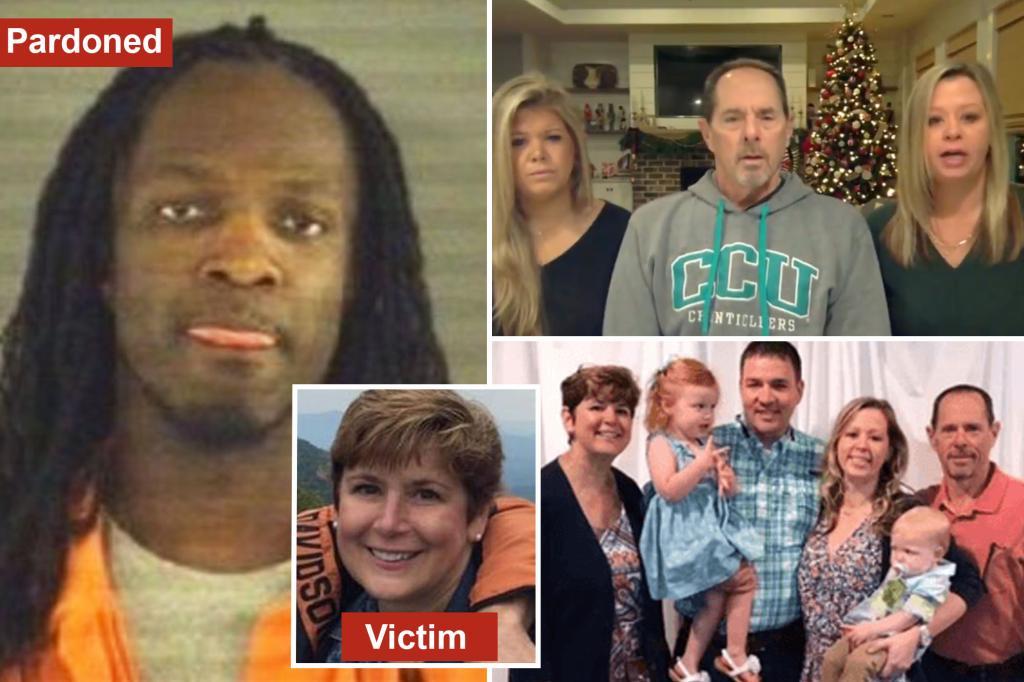The holiday season of 2023 was marred by anguish and outrage for the family of Donna Major, a South Carolina bank teller tragically murdered during a 2017 robbery. Their grief was compounded by President Biden’s decision to commute the death sentence of her killer, Brandon Council, just days before Christmas. This act of clemency, extending to 37 federal death row inmates, transformed Council’s sentence to life imprisonment without the possibility of parole. For Major’s family, the news was a devastating blow, reopening wounds that had barely begun to heal and sparking a sense of injustice. They felt betrayed by a system they had trusted to deliver justice and deeply hurt by the lack of consideration given to their suffering. The timing of the announcement, so close to a holiday meant for togetherness and remembrance, only intensified their pain.
Major’s family expressed their raw emotions in a televised interview, conveying their shock, anger, and disbelief at the President’s decision. Heather Turner, Major’s daughter, voiced her frustration at the President’s unilateral decision, made without consulting the victims’ families. She emphasized the lack of mercy shown to her mother, who was shot three times without provocation. Danny Jenkins, Major’s husband, echoed his daughter’s sentiments, highlighting the senseless brutality of the crime and the disregard for the lives shattered by Council’s actions. Their words painted a picture of a family grappling with profound loss, further exacerbated by a perceived betrayal by the justice system. The decision to commute Council’s sentence felt like a denial of justice, a disregard for their pain, and a prioritization of the criminal over the victims.
The chilling details of the 2017 crime, captured on surveillance video, further amplify the family’s anguish. The footage shows Council calmly entering CresCom Bank in Conway, South Carolina, engaging in a brief conversation with Major before abruptly drawing a gun and shooting her multiple times. He then proceeded to leap over the counter and fatally shoot another teller, 36-year-old Kathryn Skeen, also defenseless and unaware of the impending danger. This cold-blooded execution of two innocent individuals underscores the brutality of Council’s actions and the profound impact on the families left behind. The video serves as a stark reminder of the violence that tore their lives apart, making the President’s decision to grant clemency all the more incomprehensible to them.
President Biden justified his decision in a public statement, citing his moral convictions and experience in the legal system. He expressed his condemnation of the murderers and acknowledged the immense suffering of the victims’ families. However, he maintained his opposition to the federal death penalty, citing his conscience and experience as a public defender, Senator, Vice President, and President as informing his decision. He framed the commutations as consistent with his administration’s moratorium on federal executions, with exceptions for terrorism and hate-motivated mass murders. While acknowledging the gravity of the crimes, he emphasized his belief in the need to end capital punishment at the federal level. This reasoning, however, provided little comfort to Major’s family, who felt their loss was minimized in favor of a broader policy agenda.
While President Biden’s decision garnered support from some, notably Representative Ayanna Pressley, who praised it as a display of moral and compassionate leadership, it was met with fierce opposition from Major’s family. They vehemently rejected the notion that commuting Council’s sentence was an act of compassion. Katie Jenkins, another of Major’s daughters, expressed her outrage at the lack of communication from the President and the disregard for the victims’ perspectives. She emphasized the family’s trust in the judicial system and the trauma they endured throughout the trial, including witnessing the graphic evidence of her mother’s murder. The family felt their voices were silenced, their pain overlooked, and their right to justice denied. They questioned the President’s focus on the criminal’s well-being while seemingly ignoring the devastating impact of the crime on their lives.
Further intensifying the family’s sense of injustice was the revelation that their requests for a meeting with the pardon attorney were denied. Heather Turner described their efforts to communicate their story and their desire to be heard. Despite receiving notification in May that a commutation was possible, their pleas for an in-person meeting in Washington, D.C. were rejected. They were offered a brief virtual conference, which they felt was inadequate and dismissive of their suffering. This perceived disregard for their voices added another layer of pain and frustration to their ordeal. The family’s experience highlights the complex and often contentious debate surrounding capital punishment, balancing the pursuit of justice with considerations of mercy and the potential for rehabilitation.

